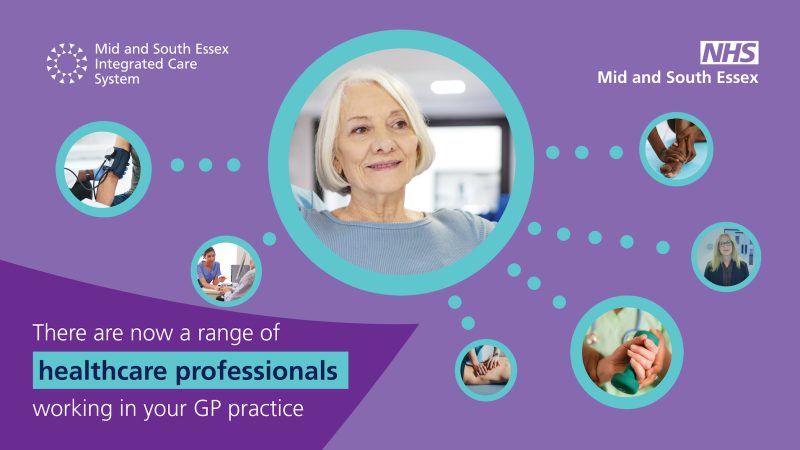
Healthcare roles in East Basildon PCN
East Basildon PCN consists of 4 GP surgeries that offer various healthcare roles supporting their patients in the local area to approximately 27,000 patients.
These supporting healthcare roles greatly help GPs in treating conditions more effectively.
A patient who is aware of additional services can self-refer their condition to the right healthcare department.
This will enable healthcare providers to see patients quicker with more effective outcomes.
It also helps patients to receive the right treatment.
One way you can help yourself today is if you submit your healthcare requirements via the social prescribing self-referral form via this link and you will signposted by one of our healthcare professionals to the right service.
Social Prescribing Link Worker
Social prescribing link workers give patients time to focus on their priorities and preferences to coproduce a simple personalised care and support plan.
Their support helps people to take control of their health and wellbeing.
Social prescribing link workers play a crucial role in ensuring the accessibility and sustainability of existing community groups by providing necessary support.
One way they can help you today is if you submit your healthcare requirements via the social prescribing self-referral form via this link and they will signpost you to the right service.
Additionally, these professionals assist individuals in establishing new groups, fostering collaboration with all local partners.
Their efforts aid in promoting a well-connected and successful community network.
Social prescribing is a comprehensive strategy that caters to individuals of all age groups and the entire community.
This proves to be especially effective for individuals:
- have one or more long term conditions
- who need support with low level mental health issues
- who are lonely or isolated
- who have complex social needs which affect their wellbeing.
Learn more about social prescribing link workers by visiting this link containing a video.
Advanced Nurse Practitioner
Advanced nurse practitioners hold a distinguished position within the nursing profession, having achieved extensive training and academic accreditation to competently evaluate, diagnose, direct, and provide care for patients presenting with complex undetermined medical issues.
As a result, advanced nurse practitioners can undertake complex reviews of patients, similar to GPs.
They can assess symptoms and provide insight of a patient’s condition, treat minor health problems, infections, minor injuries and prescribe medication where necessary.
Learn more about advanced nurse practitioners by visiting this link containing a video.
Physician Associate
Physician associates provide valuable assistance to medical practitioners in evaluating and treating patients.
They have direct contact with patients, and can carry out the following:
- taking medical histories from patients
- performing physical examinations
- diagnosing illnesses
- seeing patients with long-term chronic conditions
- performing diagnostic and therapeutic procedures
- analysing test results
- developing management plans
- provide health promotion and disease prevention advice for patients.
Learn more about advanced nurse practitioners by visiting this link containing a video.
First Contact Physiotherapist
First contact physiotherapists play an important role when it comes to musculoskeletal conditions.
The UK is facing a significant challenge in the domain of public health, as low back and neck pain have emerged as the leading contributors to years lost due to disability.
It is alarming to note that chronic joint pain or osteoarthritis are also prevalent, affecting over 8.75 million individuals.
There is an urgent need for efforts to address the growing burden of musculoskeletal disorders, which have a profound impact on the quality of life and productivity of the UK population.
First contact physiotherapists can help patients with musculoskeletal issues such as back, joint and neck pain by:
- assessing and diagnosing issues
- giving expert advice on how best to manage their conditions
- referring them onto specialist services if necessary.
Learn more about first contact physiotherapists by visiting this link containing a video.
Clinical Pharmacist
Clinical pharmacists have integrated into general practice teams yielding positive outcomes for patient care.
These highly qualified professionals specialize in medicines and offer valuable assistance in numerous ways.
One such way is conducting in-depth medication evaluations for patients with chronic health conditions, resulting in enhanced patient safety and overall outcomes.
Clinical pharmacists provide value to patients through their person-centred approach as they strive to improve their well-being.
The inclusion of clinical pharmacists within GP practices means that GPs can focus their skills where they are most needed to diagnose and treat patients with more complex conditions.
This ensures that GPs can better manage their time by attending to the needs of patients who require their specialized attention, while also providing comprehensive care to the wider patient population.
Learn more about clinical pharmacists by visiting this link containing a video.
Pharmacy Technician
Pharmacy technicians are responsible for ensuring the precise preparation, provision, and dispensation of patient medication.
These professionals are integral members of both the pharmacy and multidisciplinary healthcare teams, and they are crucial to promoting optimal patient outcomes.
By engaging in patient-centred interaction, as well as collaborating with fellow healthcare providers and clientele, pharmacy technicians guarantee the appropriate and secure usage of medicinal products.
Pharmacy technicians are registered healthcare professionals who function within the supervision of a pharmacist and responsibly liable for their own accurate and safe practice.
The key responsibilities of a pharmacy technician are:
- providing safe and effective pharmacy services
- supplying medicines and medical devices to patients, whether on prescription or over the counter and providing information on symptoms and products
- achieving the best outcomes through a patient’s medicines
- assembling and accuracy checking medicines for prescriptions
- providing information to patients, carers and other members of the healthcare team
- managing areas of medicines supply such as dispensaries
- supervising other pharmacy staff
- responding to patients’ and customers’ questions both face to face and over the phone
- pre-packing, assembling and labelling medicines
- referring problems or queries to the pharmacist
Learn more about pharmacy technicians by visiting this link containing a video.
GP Assistant (GPA)
Within the primary care setting, the General Practice Assistants (GPAs) are integral members of a multi-disciplinary team.
Their vital role involves providing administrative support, as well as undertaking basic clinical duties in select areas.
By doing so, GPAs help to alleviate the workload of General Practitioners (GPs), ensuring appointments run smoothly and enhancing the overall patient experience.
This contribution towards the efficient functioning of the surgery is invaluable, underscoring the importance of the GPAs’ support role.
The main duties of this role include:
- Sorting all clinical post and prioritising for the GP in terms of actions; Signposting some post to others such as clinical pharmacist, etc.
- Extracting all information from clinical letters that needs coding and adding to notes.
- Arranging appointments, referrals, test and follow up appointments of patients.
- Preparing patients prior to going in to see the GP, taking a brief history and basic readings in readiness for the GP appointment.
- Dipping urine, taking blood pressure, ECGs & phlebotomy.
- Completing basic (non-opinion) forms and core elements of some forms for the GP to approve and sign.
- Explaining treatment procedures to patients.
- Helping the GP liaise with outside agencies. For example, getting an on-call doctor on the phone to ask advice or arrange admission while the GP can continue with their consultation(s).
- Support the GP with immunisations/wound care.
Healthcare roles supporting the community

The NHS has realised the importance of adding and integrating additional healthcare roles into GP practices across the country.
There are other additional roles not mentioned in this post, as they are not currently available via our PCN.
When a new role is introduced, we will update this post.
If you want to know more about the additional services to access the right healthcare for you, find contact information for your local GP in East Basildon via this link.

